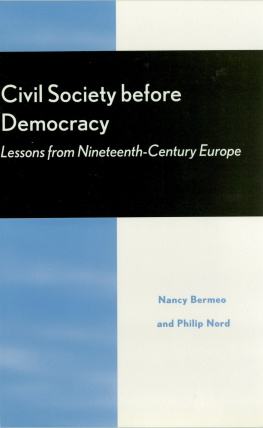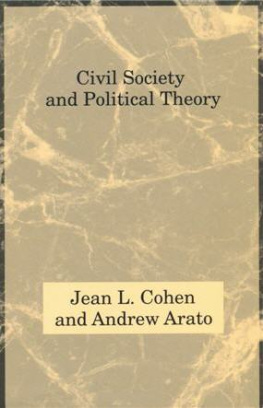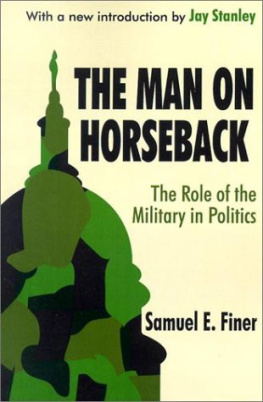ROUTLEDGE LIBRARY EDITIONS:
INTERNATIONAL SECURITY STUDIES
Volume 14
MILITARY INTERVENTION IN
DEMOCRATIC SOCIETIES
MILITARY INTERVENTION IN
DEMOCRATIC SOCIETIES
Edited by
PETER J. ROWE AND CHRISTOPHER J.
WHELAN
First published in 1985 by Croom Helm Ltd
This edition first published in 2021
by Routledge
2 Park Square, Milton Park, Abingdon, Oxon OX14 4RN
and by Routledge
52 Vanderbilt Avenue, New York, NY 10017
Routledge is an imprint of the Taylor & Francis Group, an informa business
1985 Peter J. Rowe and Christopher J. Whelan
All rights reserved. No part of this book may be reprinted or reproduced or utilised in any form or by any electronic, mechanical, or other means, now known or hereafter invented, including photocopying and recording, or in any information storage or retrieval system, without permission in writing from the publishers.
Trademark notice: Product or corporate names may be trademarks or registered trademarks, and are used only for identification and explanation without intent to infringe.
British Library Cataloguing in Publication Data
A catalogue record for this book is available from the British Library
ISBN: 978-0-367-68499-0 (Set)
ISBN: 978-1-00-316169-1 (Set) (ebk)
ISBN: 978-0-367-71356-0 (Volume 14) (hbk)
ISBN: 978-0-367-71358-4 (Volume 14) (pbk)
ISBN: 978-1-00-315046-6 (Volume 14) (ebk)
Publishers Note
The publisher has gone to great lengths to ensure the quality of this reprint but points out that some imperfections in the original copies may be apparent.
Disclaimer
The publisher has made every effort to trace copyright holders and would welcome correspondence from those they have been unable to trace.
Military
Intervention
in Democratic
Sacieties
Edited by Peter J. Rowe &
Christopher J. Whelan
1985 Peter J. Rowe and Christopher J. Whelan
Croom Helm Ltd, Provident House, Burrell Row,
Beckenham, Kent BR3 1 AT
Croom Helm Australia Pty Ltd, Suite 4, 6th Floor,
64-76 Kippax Street, Surry Hills, NSW 2010, Australia
British Library Cataloguing in Publication Data
Military intervention in democratic societies:
law policy and practice in Great Britain and the United States.
1. Public policy (Law)-Great Britain
2. Great Britain-Military policy
I. Rowe, P.J. II. Whelan, Christopher J.
363.30941 363.3-973 HV6485.G7
ISBN 0-7099-2241-8
Croom Helm, 51 Washington Street, Dover,
New Hampshire 03820, USA
Library of Congress Cataloging in Publication Data
Main entry under title:
Military intervention in democratic societies.
Bibliography: p.
Includes indexes.
1. Civil-military relations-Great Britain.
2. Law enforcement-Great Britain. 3. Civil-military
relations-United States. 4. Law enforcement-United
States. I. Rowe, P.J. (Peter J) II. Whelan,
Christopher J.
K4720.M55 1985 342.730418 85-6650
ISBN 0-7099-2241-8 347.302418
Printed and bound in Great Britain by
Biddies Ltd, Guildford and Kings Lynn
David E. Engdahl
Introduction
To the conscience of the nation that fancies itself the worlds greatest democracy, the idea of military intrusion into the affairs of civil government is profoundly repugnant. In 1972, for example, the United States Supreme Court, through Chief Justice Burger, had occasion to recall the traditional and strong resistance of Americans to any military intrusion into civilian affairs. That tradition has deep roots in our history ... ( Laird v. Tatum , 408 U.S. 1, 15). Again in 1974 the same Chief Justice observed on behalf of the Court that even where some form of government force is warranted the decision to invoke military power has traditionally been viewed with suspicion and skepticism since it often involves the temporary suspension of some of our most cherished rights ... ( Scheuer v. Rhodes , 416 U.S. 232, 246).
The enforcement of civilian laws by military means, often but not exclusively associated with riots and other civil disorders, is itself a displacement of civilian process, impermissible per se even apart from any consequences it might entail. In 1866, in Ex parte Milligan (71 U.S. 2) the Supreme Court without dissent rejected the idea that the national military could be used as an alternative to civilian measures to enforce the law, even in times of stress. The Court acknowledged that where civilian authority has actually been overthrown - the civil administration deposed, and the civil courts closed - actual and present necessity compels reliance upon the military until civil authority is restored ( id ., p. 127). In such circumstances, however, it is some hostile force that has accomplished the displacement of civilian authority. There is absolutely no lawful power in any branch of the government itself to supersede ordinary civilian law enforcement with military means.
Although the facts of the Milligan case involved an individual who had been convicted and sentenced by a military tribunal, the principle proclaimed by the Supreme Court pertains equally to military measures short of trial. During the Civil War, Union troops had been employed on countless occasions in the loyal northern states, superseding regular civilian officials to suppress civil disorders, seizing and confining civilians suspected of supporting the Confederacy. Thousands were detained, many never being brought even to military trial, under the claimed authority of the President as Commander-in-Chief, relying upon an opinion written in 1861 by United States Attorney General
The thesis advanced by Bates was the same thesis advanced by his successor in the Milligan case. The Courts rationale in Milligan , rejecting that particular application of Bates thesis, reaches and discredits the whole. Nevertheless, for several years after Milligan , flagrant and wilful disregard of the Supreme Courts principle characterized the process of reconstructing the South. Thus it should not seem remarkable that during the past several years, despite Chief Justice Burgers reminders of the constitutional doctrine, new foundations have been laid for military intervention in the United States.
In 1972 the Nixon administration promulgated a set of new regulations, Employment of Military Resources in the Event of Civil Disturbances (now codified as 32 C.F.R. sec. 215), claiming colour of legality for very substantial military intrusions into the realm of domestic government. The 1972 Regulations took the place of others first devised in 1968 during the Johnson administration (33 Fed. Reg. 9339, June 25) and discontinued in 1971 (36 Fed. Reg. 21339, Nov. 5). The 1968 Regulations themselves had been objectionable on some points of law? but novel provisions in the 1972 Regulations dramatically increased the potential for domestic use of the national military while at the same time substantially reducing prior safeguards against abuse. Then in 1973, at Wounded Knee, the Nixon administration employed the military for law enforcement in a situation which not even those indulgent new Regulations had contemplated. (This episode is discussed later.) The 1972 Civil Disturbance Regulations have remained in force through three subsequent administrations without any modification; Justice Department lawyers still continue to defend those who used the military at Wounded Knee even beyond what those Regulations allow. Moreover, in March of 1982 the Department of Defense issued new regulations entitled DOD Cooperation With Civilian Law Enforcement Officials (32 C.F.R., sec. 213), which reassert the sweeping claims of executive prerogative for military intervention asserted in the 1972 Regulations.

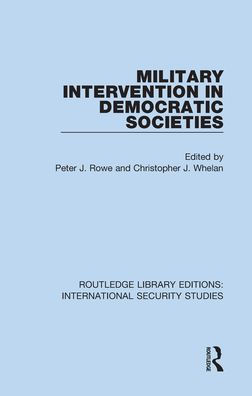

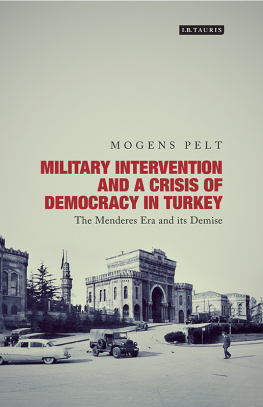
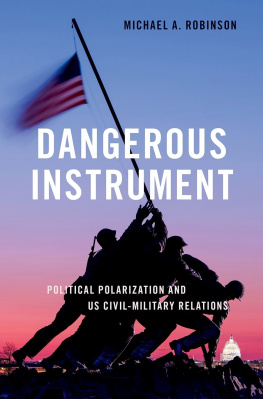

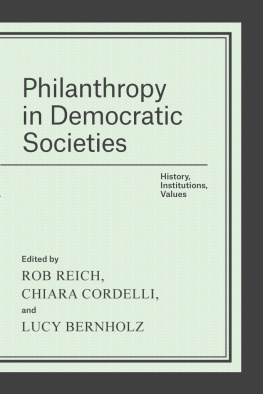
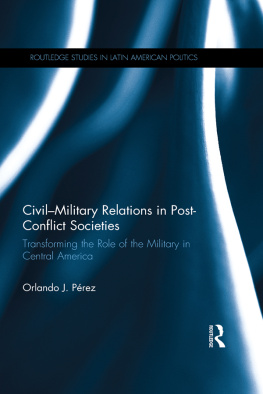
![Fawcett - How to lose the Civil War : [military mistakes of the War between the States]](/uploads/posts/book/92687/thumbs/fawcett-how-to-lose-the-civil-war-military.jpg)
